Historical characters often seem “one-dimensional” like cardboard cutouts.
In addition to Ben, we tend to carry and perpetuate oversimplified and often incorrect stereotypes of many historical persons. This post explores some common misconceptions and the reasons why.
We have already discussed in a prior post the stereotype of Ben Franklin as the “wise, corpulent, gouty statesman”. At least Ben is generally considered a positive figure in history. He was a founding father of the United States. He signed the declaration of independence. He invented electricity – right? Not exactly. Yes, he did important experiments with electricity – probably not involving a key and a kite – but other scientists of the day were doing experiments too.
In this post, I want to explore the stereotypes of Marie “let them eat cake” Antoinette, and Casanova – to whose name now a dictionary definition has become “a man with a reputation for having many amorous adventures, a rake”.
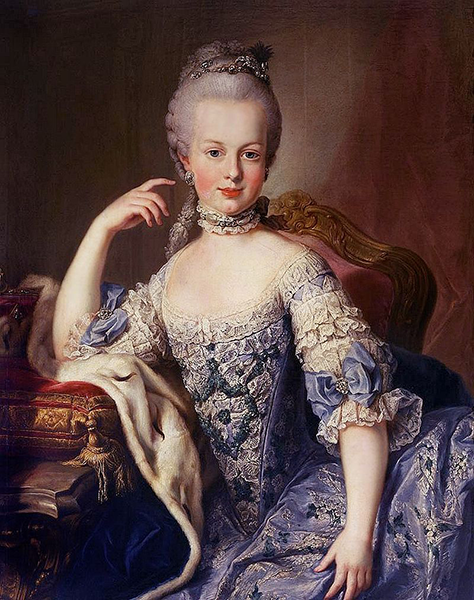
Marie Antoinette was the youngest daughter of Maria Therese – Empress of the Habsburg empire. She was married off in an arranged marriage to the dauphine (heir apparent) of France at the age of 14 in order to assure a partnership between the two empires. Based on the portrait above, she was quite an ingenue – however, she was known to have quite a spirit as well.
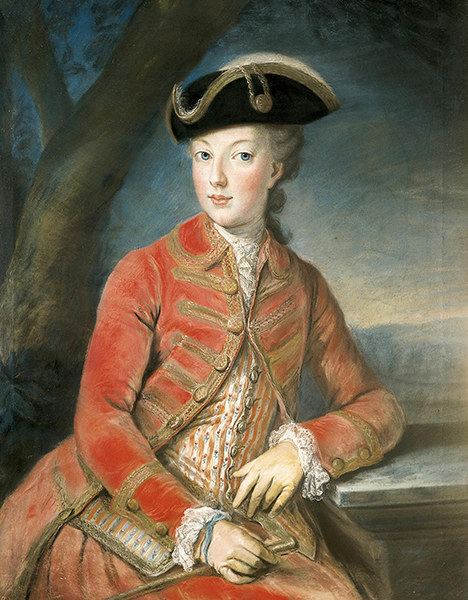
Here she is dressed for the hunt. She was an accomplished horse rider and reportedly quite a tomboy in her youth.
Four years after her marriage, she was thrust into the role of Queen of France at the age of 18. Despite what must have been a very uncomfortable situation with many of the older courtiers of the French court, she won over many, and even became a favorite of the French people early on. There are stories (alluded to in The Wisdom of the Flock) of her escapades, including gambling and partying with the “common folk” of Paris.
She was an accomplished musician, singer, and actress and always enjoyed performing.
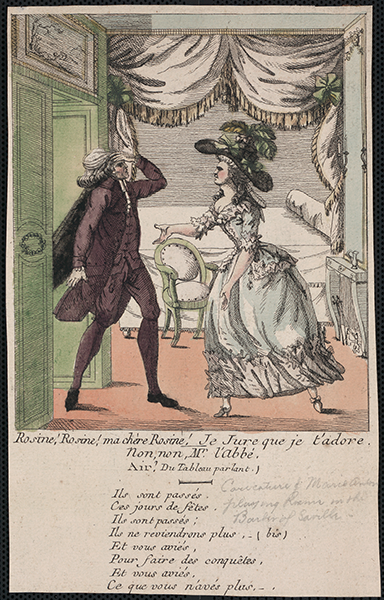
And while she was sometimes satirized for her roles (as in the image above) – she was nonetheless passionate about performing.
One might imagine that she considered her whole life a performance. She lived it out in a fishbowl, to be sure. There was a lot of attention paid to why she didn’t bear any children for her husband (the king) immediately after their marriage – an anecdote related in The Wisdom of the Flock. And although with a role played by Marianne Davies that is purely fictional, her brother Joseph apparently did have to “investigate”.
However, she ultimately bore the king four children, and by all accounts was a loving and dutiful mother to them.
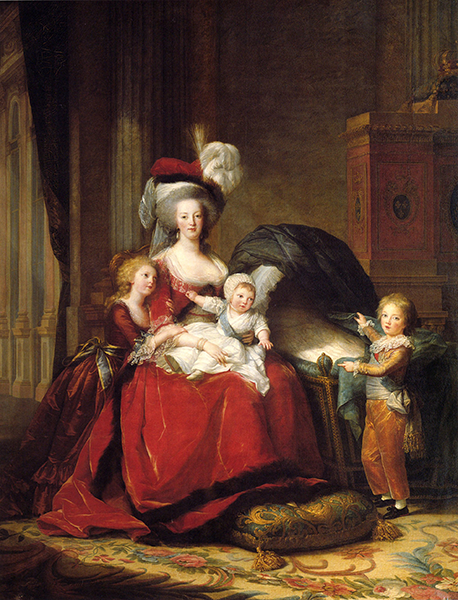
The empty crib is shown above because her youngest daughter Sophie died at age 11 months.
So what happened to cause her downfall in public opinion and the way we perceive her now?
True, there were scandals such as https://en.wikipedia.org/wiki/Affair_of_the_Diamond_Necklace in 1785 (about the time that Ben was leaving France) that damaged her reputation. And she was suspected of having an affair with Count Axel von Fersen of Sweden. She was probably guilty of that transgression per many historical accounts. However, extra-marital affairs for both men and women were less scandalous then than now. And people accused her of having lavish taste – which was undoubtedly true. But it has also been observed that the financial strain placed on France by their support of the American Revolution may have played a role in the downfall of the French aristocracy. And, the downfall of the French aristocracy was not due to any actions of Marie Antoinette alone.
And, of course, she never really said “Let them eat cake”. https://www.history.com/news/did-marie-antoinette-really-say-let-them-eat-cake
She was not a callous person. She even apologized to her executioner for accidentally stepping on his foot on her way to the guillotine. https://en.wikipedia.org/wiki/Marie_Antoinette
Therefore, in my humble opinion, Marie Antoinette was a complex person who, by all accounts, loved her adopted country of France very much, but was caught up in the revolutionary fervor that ultimately led to her demise. Many of the things we know about her today come from the smear campaign of that time. Could she be vain, privileged, and self-indulgent? Without a doubt. She was high born. But consider a 14-year-old bride to the heir to the French throne, who somehow (for a time) becomes a respected queen and mother. A woman who knows enough to make several attempts at economic reform in France before the revolution, and helps bring the United States of America into being. I believe that we should celebrate her.
Next let’s explore Casanova. 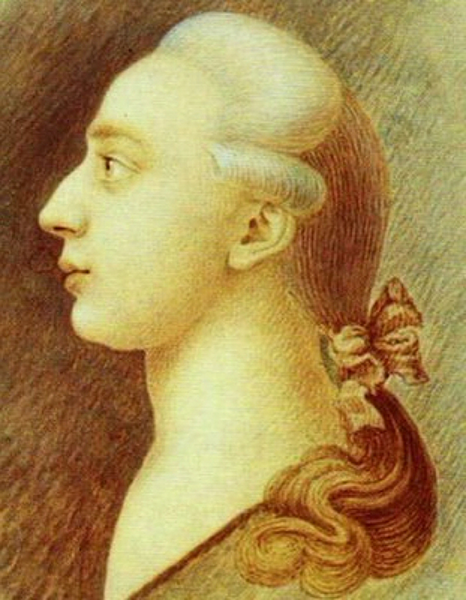
Giacomo Girolamo Casanova is characterized as an adventurer and author from Venice. But as noted above, the dictionary of today defines him only as a rake. He came from humble beginnings. He studied law initially but did not practice. He wrote several plays and dabbled in acting at times. He was a polymath. He also studied religion, of many types, which did not make him popular with the rulers of Venice at the time. Yet, they also sent him on several missions to spy for them. He studied Freemasonry, achieving the level of a Master. He claimed to be a Rosicrucian and an alchemist. Even during his lifetime, people would pay to hear his tales and for his knowledge. But some of his contemporaries considered him to be a fraud and a charlatan. He probably could be seen as either at times. Depending on circumstances, he might use fictitious names, such as baron or count of Farussi (the maiden name of his mother) or Chevalier de Seingalt. He was a gambler who had his share of wins and losses. He was imprisoned many times – both for his irreverent and outspoken beliefs, as well as (at points in his life) his indebtedness. He also escaped from the Doge Palace and the “Bridge of Sighs” – which, if you have ever been there, is hard to imagine. One such experience is described in The Wisdom of the Flock. He is, of course, famous for his sexual dalliances – or perhaps more specifically for the documentation of them – which he did throughout his life and notably in his memoirs. However, he also documented what he ate every day too.
There are many editions of his memoirs available. And some (not from his own time, but later editions) come accompanied by quite erotic illustrations. These pictures were most likely added to his words for titillation. They seem fairly harmless by today’s standards but were likely considered the pornography of their era. The publishing of these editions did not elevate his reputation.
My favorite edition is the 1925 series accompanied by the illustrations of Rockwell Kent including the pose described in The Wisdom of the Flock:
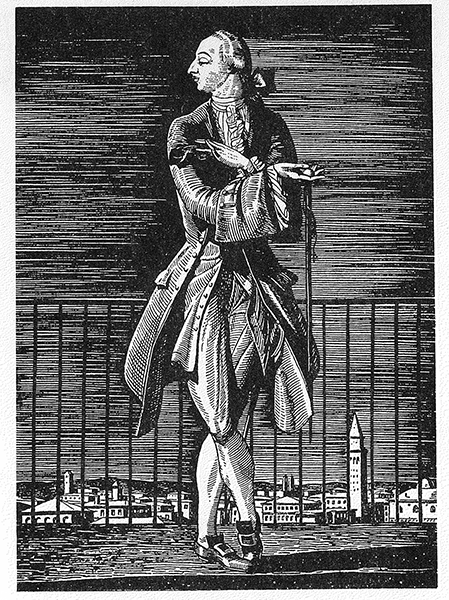
As can be seen, he could be quite a dandy.
His attraction to women, however, may have come more from his treatment of them as equals – a rare quality for men of his time. Those same men likely contributed to our view of him today through their accusations of his “inappropriate dalliances” with the women that they considered to be their property.
So, we find that once again, like Marie Antoinette, Casanova was a complex character – not nearly as “one-dimensional” as history paints him.
Unfortunately, in my opinion, Casanova’s qualities of brilliant intelligence, spiritualism, and sharp wit have not been as well remembered through the years.
The best book that I have found for learning more about the real life of Casanova is the one by J. Rives Childs: Casanova A New Perspective. Paragon House, NY 1988 https://www.amazon.com/Casanova-Perspective-J-Rives-Childs/dp/0913729698
It seems to me that we should be careful about how we choose to perceive historical characters – not always accepting the way that they come “packaged” for us through the filter of history.

